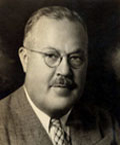
Wilburt C. Davison, MD

Wilburt C. Davison, MD, the first dean of the medical school, was also the first Department of Pediatrics chairman. Recruited from Johns Hopkins University in 1926, Dr. Davison brought a new approach to health care and health education to Duke — an approach that was highly unorthodox, defying traditional rigidness but preserving excellent quality. He founded the medical school and medical center with young, unproven faculty and flexible educational policies. He also helped found the Blue Cross Hospital Insurance Program for North Carolina, and developed the private diagnostic clinic system that was copied across the nation.
Davison was so effective that, within five years of its founding, Duke was considered to be in the top 10 percent of medical centers in America. Today Duke is recognized as one of the foremost medical centers in the world, with an enviable reputation for excellence in medical school teaching, house staff training, research, and clinical care.
Davison served as chairman of Pediatrics from 1927 to 1954 and as dean until 1960. Being a generalist, he believed in nurturing a small department of versatile pediatricians, sending them into the community to practice, and using them to teach the medical students. In those early days, the clinics were staffed by residents and pediatricians from the practicing community.
Jerome Harris, MD

The second chairman, Jerome Harris, MD, was one of Dr. Davison’s recruits. Originally coming to Duke as a biochemist in 1936, Dr. Harris became an instructor in pediatrics in 1937 under J. Buren Sidbury, one of two pediatricians in the state when Duke opened. Later, Dr. Harris was named the first J. Buren Sidbury Professor. At a time when sub-specialties were developing, he trained himself in pediatric cardiology and introduced sub-specialties to the Department of Pediatrics. He served as chairman from 1954 to 1968.
Samuel L. Katz, MD

Samuel L. Katz, MD, is an honors graduate of Dartmouth College and Harvard Medical School. After medical internship at Beth Israel Hospital he completed pediatrics residency training at the Massachusetts General Hospital and the Boston Children's Hospital, followed by a research fellowship in virology and infectious diseases, and then became a staff member at Children's Hospital working with Nobel Laureate John F. Enders. He remained with Enders for 12 years during which time they developed the attenuated measles virus vaccine now used throughout the world. In addition to his work on measles, Dr. Katz has been involved in studies of many other pathogens and infectious diseases including vaccinia, polio, rubella, influenza, pertussis, HIV, and Haemophilus influenzae b conjugates. As chairman, Dr. Katz was instrumental in planning Pediatrics’ move to the fifth floor of Duke Hospital. He also presided over a major expansion of the department’s staff, leading Duke pediatrics into the global arena with its divisional sub-specialties. Dr. Katz stepped down in 1990 to pursue clinical research in infectious diseases.
Michael M. Frank, MD

Michael M. Frank, MD, is an internationally recognized physician scientist, specializing in allergy and infectious diseases. The former clinical director of the National Institute of Allergy and Infectious Diseases at the National Institutes of Health, Dr. Frank served as chairman from 1990 to 2004. He strengthened and expanded the department’s clinical and research programs while developing house officer training opportunities. Dr. Frank continued his research and was an active member of the Department of Pediatrics until his passing in August 2019.
Joseph St. Geme, MD

Joseph St. Geme, MD, served as chairman of the Department of Pediatrics from 2005 to 2013. A nationally-recognized expert in basic research and clinical treatment for pediatric infectious diseases, he was professor of pediatrics and molecular microbiology at Washington University School of Medicine in St. Louis. Dr. St. Geme was a postdoctoral fellow in infectious diseases and microbiology at Stanford University from 1988 to 1992. He served as chief resident in Pediatrics at Children's Hospital of Philadelphia from 1987 to 1988 after completing residency training at the Children's Hospital. Dr. St. Geme graduated from Stanford University in 1979 and earned a medical degree from Harvard Medical School in 1984.
Ann M. Reed, MD

Ann M. Reed, MD, began serving as chair of the Department of Pediatrics and Physician-in-Chief of Duke Children’s Hospital & Health Center, in 2014. An internationally known and respected researcher, Dr. Reed has helped to identify genes that predispose children to juvenile dermatomyositis and provide a comprehensive understanding of the genetics of the disease. Prior to joining Duke, Dr. Reed served for three years at Mayo Clinic as chair of the Department of Pediatric and Adolescent Medicine and physician-in-chief for the Mayo Clinic Children’s Center in Rochester, Minnesota. She was also a professor of pediatrics and medicine at the Mayo Medical School and a consultant in the Division of Rheumatology in both the Departments of Pediatric and Adolescent Medicine and Internal Medicine.
Dr. Reed received her MD degree from the Medical College of Ohio. She completed an internship and residency in pediatrics at Children’s Hospital Medical Center of Akron and a fellowship in clinical immunology/rheumatology at Northwestern University/Children’s Memorial Hospital in Chicago. She also completed a research fellowship in a molecular genetics laboratory at the University of Chicago.
Prior to joining Mayo Clinic, Dr. Reed was a tenured associate professor at the University of North Carolina at Chapel Hill and was active in a collaborative program with Duke providing care for pediatric rheumatology patients. She continues to be active in clinical care of children with autoinflammatory disease and dermatomyositis, an inflammatory muscle disease marked by a distinctive skin rash.
Watch a video highlighting selected notable achievements in the history of Duke Children's and the Duke Department of Pediatrics.